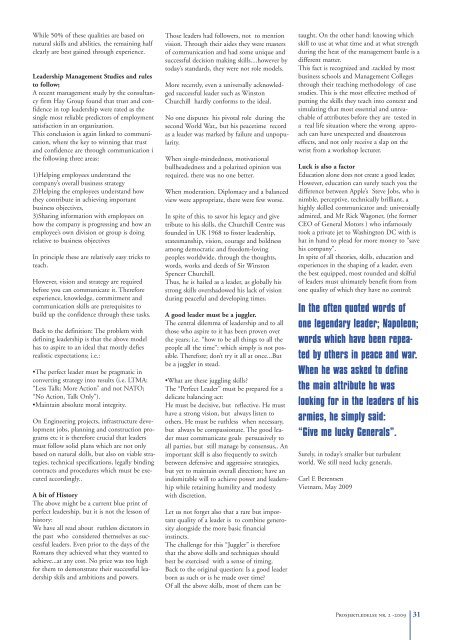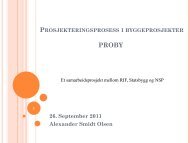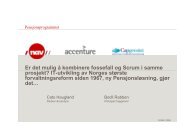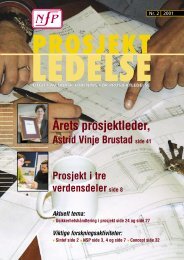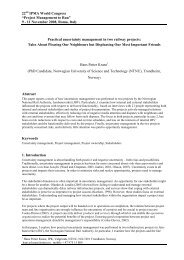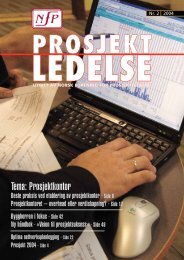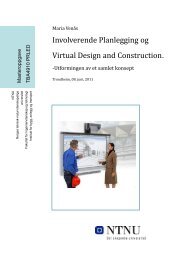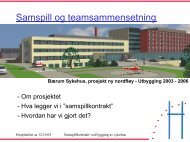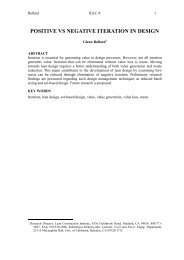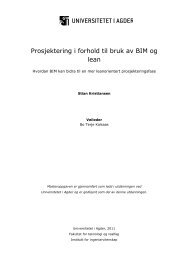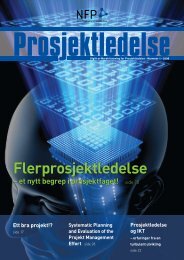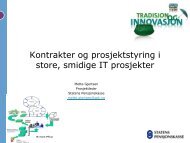Last ned pdf her... (2,1 Mb) - Norsk senter for prosjektledelse - NTNU
Last ned pdf her... (2,1 Mb) - Norsk senter for prosjektledelse - NTNU
Last ned pdf her... (2,1 Mb) - Norsk senter for prosjektledelse - NTNU
Create successful ePaper yourself
Turn your PDF publications into a flip-book with our unique Google optimized e-Paper software.
While 50% of these qualities are based on<br />
natural skills and abilities, the remaining half<br />
clearly are best gai<strong>ned</strong> through experience.<br />
Leadership Management Studies and rules<br />
to follow;<br />
A recent management study by the consultancy<br />
firm Hay Group found that trust and confidence<br />
in top leadership were rated as the<br />
single most reliable predictors of employment<br />
satisfaction in an organization.<br />
This conclusion is again linked to communication,<br />
w<strong>her</strong>e the key to winning that trust<br />
and confidence are through communication i<br />
the following three areas:<br />
1)Helping employees understand the<br />
company’s overall business strategy<br />
2)Helping the employees understand how<br />
they contribute in achieving important<br />
business objectives,<br />
3)Sharing in<strong>for</strong>mation with employees on<br />
how the company is progressing and how an<br />
employee’s own division or group is doing<br />
relative to business objectives<br />
In principle these are relatively easy tricks to<br />
teach.<br />
However, vision and strategy are required<br />
be<strong>for</strong>e you can communicate it. T<strong>her</strong>e<strong>for</strong>e<br />
experience, knowledge, commitment and<br />
communication skills are prerequisites to<br />
build up the confidence through these tasks.<br />
Back to the definition: The problem with<br />
defining leadership is that the above model<br />
has to aspire to an ideal that mostly defies<br />
realistic expectations; i.e.:<br />
•The perfect leader must be pragmatic in<br />
converting strategy into results (i.e. LTMA:<br />
“Less Talk; More Action” and not NATO;<br />
“No Action, Talk Only”).<br />
•Maintain absolute moral integrity.<br />
On Engineering projects, infrastructure development<br />
jobs, planning and construction programs<br />
etc it is t<strong>her</strong>e<strong>for</strong>e crucial that leaders<br />
must follow solid plans which are not only<br />
based on natural skills, but also on viable strategies,<br />
technical specifications, legally binding<br />
contracts and procedures which must be executed<br />
accordingly..<br />
A bit of History<br />
The above might be a current blue print of<br />
perfect leadership, but it is not the lesson of<br />
history:<br />
We have all read about ruthless dictators in<br />
the past who considered themselves as successful<br />
leaders. Even prior to the days of the<br />
Romans they achieved what they wanted to<br />
achieve...at any cost. No price was too high<br />
<strong>for</strong> them to demonstrate their successful leadership<br />
skils and ambitions and powers.<br />
Those leaders had followers, not to mention<br />
vision. Through their aides they were masters<br />
of communication and had some unique and<br />
successful decision making skills....however by<br />
today’s standards, they were not role models.<br />
More recently, even a universally acknowledged<br />
successful leader such as Winston<br />
Churchill hardly con<strong>for</strong>ms to the ideal.<br />
No one disputes his pivotal role during the<br />
second World War,, but his peacetime record<br />
as a leader was marked by failure and unpopularity.<br />
When single-mindedness, motivational<br />
bullheadedness and a polarized opinion was<br />
required, t<strong>her</strong>e was no one better.<br />
When moderation. Diplomacy and a balanced<br />
view were appropriate, t<strong>her</strong>e were few worse.<br />
In spite of this, to savor his legacy and give<br />
tribute to his skills, the Churchill Centre was<br />
founded in UK 1968 to foster leadership,<br />
statesmanship, vision, courage and boldness<br />
among democratic and freedom-loving<br />
peoples worldwide, through the thoughts,<br />
words, works and deeds of Sir Winston<br />
Spencer Churchill.<br />
Thus, he is hailed as a leader, as globally his<br />
strong skills overshadowed his lack of vision<br />
during peaceful and developing times.<br />
A good leader must be a juggler.<br />
The central dilemma of leadership and to all<br />
those who aspire to it has been proven over<br />
the years; i.e. “how to be all things to all the<br />
people all the time”: which simply is not possible.<br />
T<strong>her</strong>e<strong>for</strong>e; don’t try it all at once...But<br />
be a juggler in stead.<br />
•What are these juggling skills?<br />
The “Perfect Leader” must be prepared <strong>for</strong> a<br />
delicate balancing act:<br />
He must be decisive, but reflective. He must<br />
have a strong vision, but always listen to<br />
ot<strong>her</strong>s. He must be ruthless when necessary,<br />
but always be compassionate. The good leader<br />
must communicate goals persuasively to<br />
all parties, but still manage by consensus,. An<br />
important skill is also frequently to switch<br />
between defensive and aggressive strategies,<br />
but yet to maintain overall direction; have an<br />
indomitable will to achieve power and leadership<br />
while retaining humility and modesty<br />
with discretion.<br />
Let us not <strong>for</strong>get also that a rare but important<br />
quality of a leader is to combine generosity<br />
alongside the more basic financial<br />
instincts.<br />
The challenge <strong>for</strong> this “Juggler” is t<strong>her</strong>e<strong>for</strong>e<br />
that the above skills and techniques should<br />
best be exercised with a sense of timing.<br />
Back to the original question: Is a good leader<br />
born as such or is he made over time?<br />
Of all the above skills, most of them can be<br />
taught. On the ot<strong>her</strong> hand: knowing which<br />
skill to use at what time and at what strength<br />
during the heat of the management battle is a<br />
different matter.<br />
This fact is recognized and .tackled by most<br />
business schools and Management Colleges<br />
through their teaching methodology of case<br />
studies. This is the most effective method of<br />
putting the skills they teach into context and<br />
simulating that most essential and unreachable<br />
of attributes be<strong>for</strong>e they are tested in<br />
a real life situation w<strong>her</strong>e the wrong approach<br />
can have unexpected and disasterous<br />
effects, and not only receive a slap on the<br />
wrist from a workshop lecturer.<br />
Luck is also a factor<br />
Education alone does not create a good leader.<br />
However, education can surely teach you the<br />
difference between Apple’s Steve Jobs, who is<br />
nimble, perceptive, technically brilliant, a<br />
highly skilled communicator and: universially<br />
admired, and Mr Rick Wagoner, (the <strong>for</strong>mer<br />
CEO of General Motors ) who infamously<br />
took a private jet to Washington DC with is<br />
hat in hand to plead <strong>for</strong> more money to “save<br />
his company”.<br />
In spite of all theories, skills, education and<br />
experiences in the shaping of a leader, even<br />
the best equipped, most rounded and skilful<br />
of leaders must ultimately benefit from from<br />
one quality of which they have no control:<br />
In the often quoted words of<br />
one legendary leader; Napoleon;<br />
words which have been repeated<br />
by ot<strong>her</strong>s in peace and war.<br />
When he was asked to define<br />
the main attribute he was<br />
looking <strong>for</strong> in the leaders of his<br />
armies, he simply said:<br />
“Give me lucky Generals”.<br />
Surely, in today’s smaller but turbulent<br />
world. We still need lucky generals.<br />
Carl E Berentsen<br />
Vietnam, May 2009<br />
Prosjektledelse nr. 2 -2009 31


